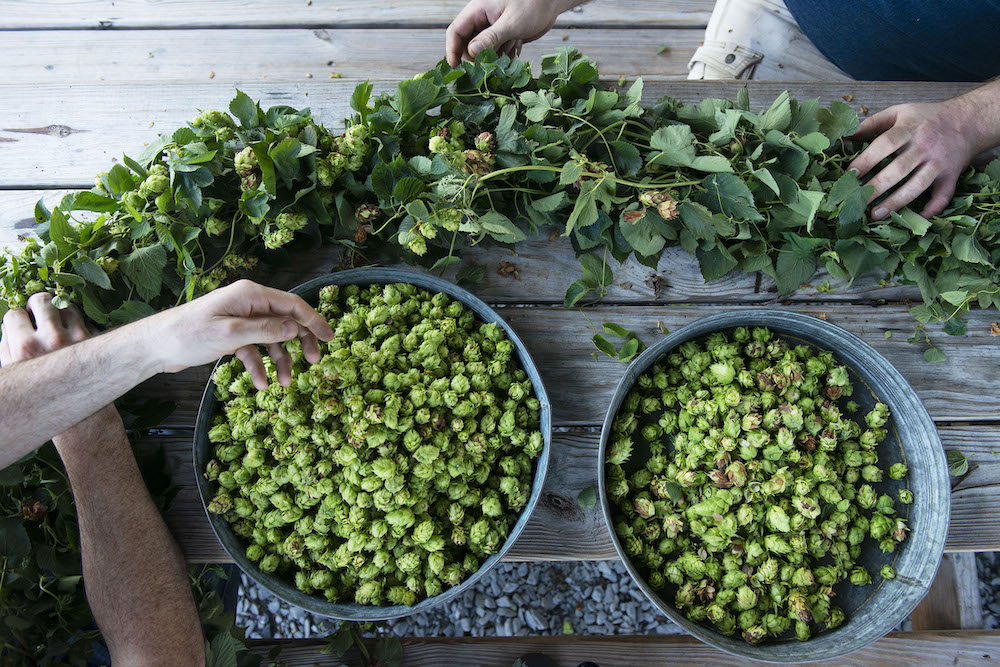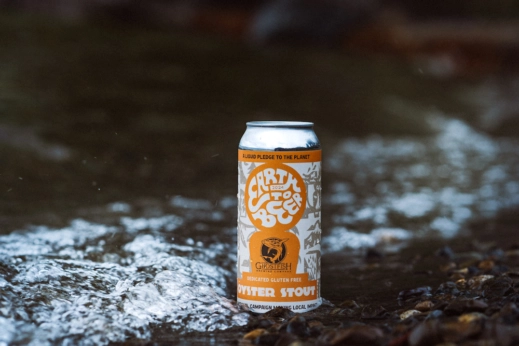This month, Earth to Beer is raising awareness about sustainability and conservation by bringing together breweries and nonprofits in a collaborative effort to make more environmentally friendly beer.

Brewing takes a heavy toll on the environment. The average brewery uses six gallons of water to make just one gallon of beer, with base and specialty ingredients flown around the globe and trucks of cans and kegs driven up and down the country. Add in the stickers and plastic sleeves that make many beer cans non-recyclable, and packaged beer takes an even higher toll. But when you’re relaxing with a cold one, the last thing you’re probably thinking of is the environmental cost of the beer in your hand.
Conservationist Eric Steen aims to change that. His Earth to Beer project is bringing together over 35 breweries from across the US to make a commitment to brewing a mindfully sourced and packaged beer in collaboration with local environmental nonprofits this Earth Day, “to pack as much sustainability as possible into each can.”
As the impacts of climate change intensify worldwide, there is a greater awareness that we need to make changes in our daily lives to help combat its effects. With this project, Steen is enabling breweries and drinkers to do this in an open-ended and collaborative fashion. “What I think is truly unique about Earth to Beer is that we don’t prescribe a specific way to approach the environmental question,” Steen explains. “We aren’t telling brewers to buy organic only, we’re saying that organic is one of many great options that also include local, regenerative agriculture, other certifications like Salmon-Safe, non-certified but responsibly grown, and more. This decentralized approach allows breweries to get creative in ways that make sense for them, their budgets, and their communities.”

Ghostfish Brewing of Seattle is putting out an oyster stout and supporting the Puget Sound Restoration Fund as part of the Earth to Beer project. (Photo courtesy Ghostfish Brewing)
Steen aims to make the project as accessible as possible for breweries and drinkers, offering negotiated discounts with suppliers, information about ethical sourcing, and marketing and branding resources and custom artwork to help breweries attract interest from customers and retailers. Brewers can make any style of beer and use whichever sustainable resources they feel will suit their needs best. Recipes released already include Aslan Brewing’s classic Amber Ale, which uses all Salmon-Safe certified hops, and GearHouse Brewing’s Imperial Honey Wheat Ale brewed with Pennsylvania honey and aged in locally sourced whiskey barrels.
Earth to Beer features participants from Alaska to Texas to Hawaii, all of whom have committed to working with sustainable suppliers and partnering with a local environmental nonprofit. “We’ve asked breweries to reverse the role of what normally happens with a nonprofit — usually the nonprofit approaches the brewery and there’s a pretty hands-off way of giving donated beer for a cause. In Earth to Beer, breweries have to find a nonprofit they want to work with, do the outreach and invite them in” says Steen.
Oddwood Brewing in Austin TX has chosen to partner with the Colorado River Alliance for the project. “With good, clean water being absolutely crucial to the creation of good beer we, as a small community-oriented brewery, wanted to team up with those that are fighting to protect our water and communities,” says Oddwood’s events and operations manager Charlie Mikulich. Oddwood is also sourcing its malt from TexMalt, a locally based supplier that works with nearby farms to reduce the carbon footprint of malt supply. It is also sourcing from Yakima Chief Hops, a grower-owned family farm collective that uses green energy to power its facilities, a water reclamation program to keep local habitats safe, and created the Green Chief Program (a sustainability management program that promotes and develops guidelines for all their farms).
Breweries are required to pay a small fee to join Earth to Beer and make a contribution to the nonprofit of their choice, depending on brewery size, ranging from $500-$1,000 minimum. They are also expected to begin open-ended collaborations, such as providing beer for events and offering free meeting spaces. For startups and minority-owned breweries, sponsor Arryved, which specializes in point-of-sale technology, has provided a stipend so cost doesn’t prohibit participation. “Building a better world through beer requires not only more sustainable ingredients and processes, but also more opportunities for people of color to participate and contribute to the creativity and problem solving we will need to get there,” says Aaron Gore, Director of Community and Partnerships at Arryved.

MadTree Brewing in Cincinnati, Ohio organizes staff volunteer days and donates one percent of all sales to local nonprofits. (Photo courtesy MadTree Brewing)
Another sponsor and collaborator is Canworks, the first US company to print directly onto aluminum cans, eliminating plastic waste and making them recyclable. “There is a challenge in consumer awareness. Most consumers don’t realize that many of the cans they recycle are covered in shrink sleeves and those cans are going straight to a landfill because of that,” says Canworks head of marketing Daniel Rigdon. That’s where Earth to Beer comes in. “Educating consumers so they can make informed decisions is the fastest way to effect change,” Rigdon explains.
Steen aims to spearhead wider industry change by creating a multi-layered, inclusive, educational and open-ended initiative. “Formalizing a campaign around Earth Day and institutionalizing it will go a long way to get breweries who aren’t thinking about their impact to start to care,” he says. This is also the goal for Tulsa OK’s Heirloom Rustic Ales, which is partnering with the Conservation Coalition of Oklahoma. “Our hope for this project is that other brewers (and growers) will see that consumers appreciate, and even gravitate towards, agriculturally holistic products,” says co-owner and brewer Jake Miller.
For Steen, the key goal is to raise awareness about brewing and drinking intentionally. “If you’re not already intentional in the way that you source your ingredients, consider making one beer a year where you change things up. And each time you make this beer, get a little more intentional about it,” he says. His advice to consumers? “Ask breweries what they’re doing to support producers and suppliers who are environmental stewards, and go out of your way to support breweries that are intentional.”
Earth to Beer releases will be available around the country this April. Find the full list of participating breweries here.

